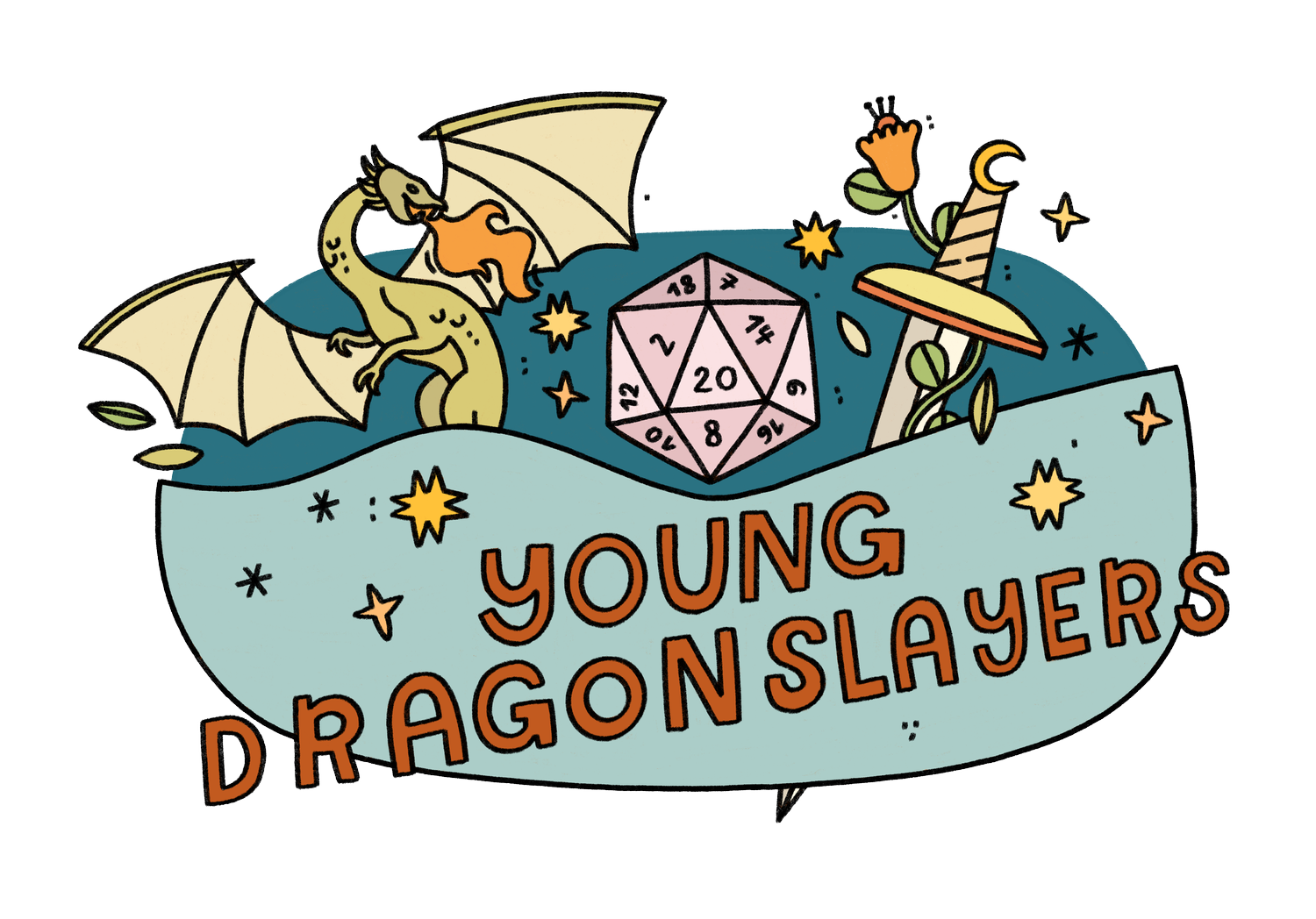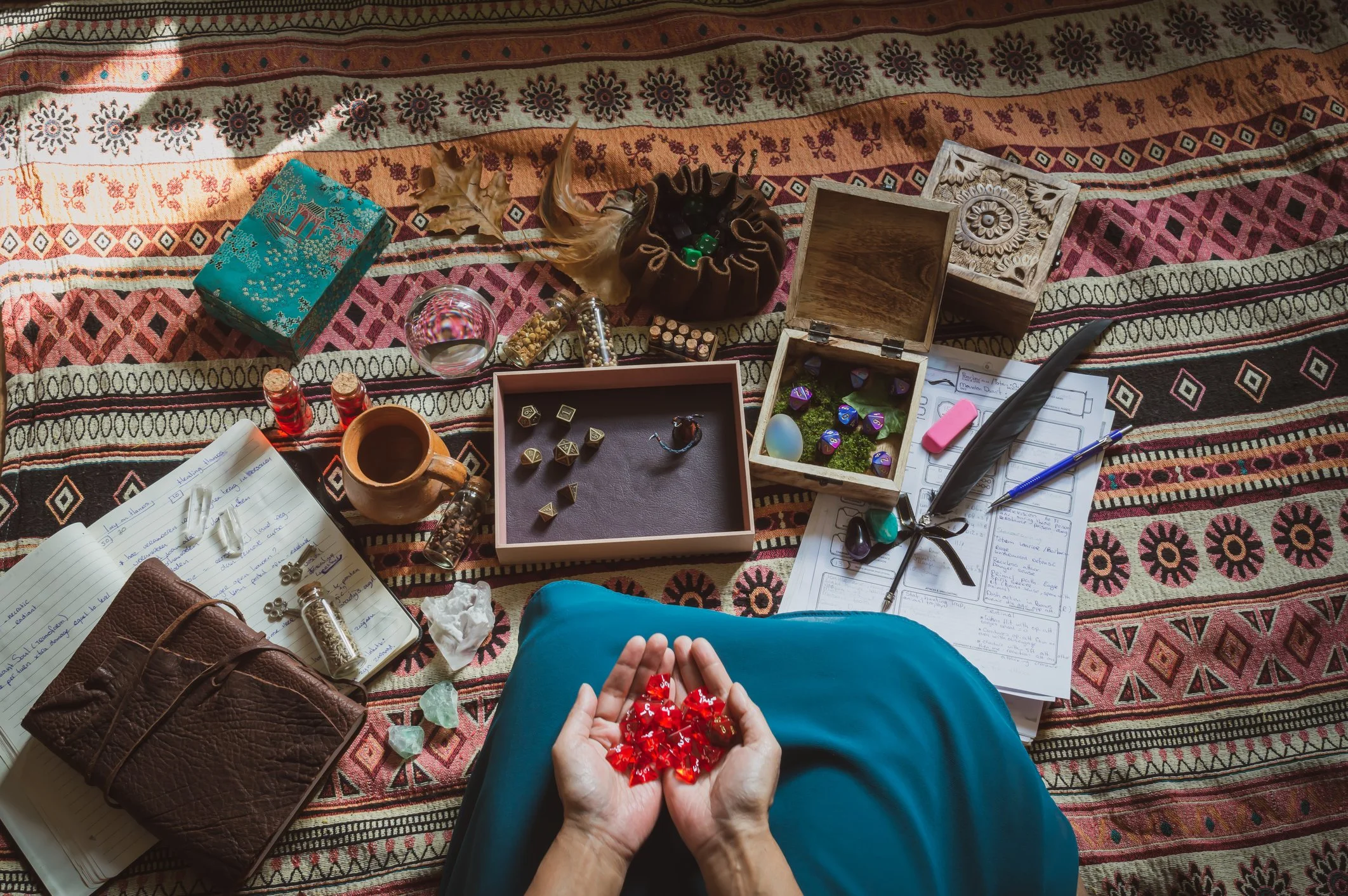Your Homeschooler’s New Favorite Social Activity Is Here.
Young Dragonslayers™ offers imaginative D&D adventures that encourage social-emotional learning in an inclusive, affirming environment.
Homeschool Activities That Break the Traditional Mold
If you are a progressive homeschooling parent, you may find that many popular homeschool activities were simply not designed with your family in mind. This is especially true if you’re parenting a child who is neurodivergent, LGBTQ+, or has special needs and interests that do not fit well within the mold of a traditional school experience.
Homeschooling offers these kids the opportunity to pursue passions at their own pace, without getting squashed by a system that wasn’t built for them. But if you’ve ever rolled up to a local homeschooling function and realized you were not among your people, you know it can also feel pretty isolating. People homeschool for so many different reasons that there’s no guarantee you’re automatically going to click!
Even the deepest of introverts need to be among their peers sometimes. But what to you do if your teen isn’t interested in, say, Homeschool Prom? What if your tween isn’t of the super athletic variety? Where do you go to find kids who are friendly, likeminded, and welcome all kinds of diversity? When you become the coordinator of your child’s whole social calendar, this can definitely be a challenge. Maybe you’ve found that:
You are forever striking a balance between luring your introvert out of their bedroom and allowing them to take the solo time they need to decompress.
Your child is too old for many standard homeschool activities, but still too young to volunteer or get a part-time job.
Your kid’s not really into organized sports…or solo sports…or…any sports.
You’re juggling the activity schedules of multiple family members, including yourself.
Your child can’t find local kids who share their niche interests.
You have tried out a few homeschool activities and extracurriculars only to discover—surprise! They weren’t secular and didn’t align with your values.
Simply put, it’s hard to find secular social groups for homeschoolers. If you’re looking for structured activities that also feel progressive, creative, and affirming, we’re here to help.
Secular & Inclusive Online Homeschool Social Groups
If you can’t find what you’re looking for locally, online clubs are a great way to fill the gaps in your child’s social support system. Naturally, we are partial to our own program, Young Dragonslayers™! We gather kids together to play Dungeons & Dragons online, with the goal of building friendships and fostering a sense of belonging through gameplay.
However, one D&D game a week won’t solve your child’s social life. So we’ve compiled this list of other progressive, inclusive online social programs that support secular, neurodiverse, and LGBTQ+ homeschool families. Hopefully, we’ve gone beyond the basics to serve up some creative ideas you might not have discovered yet.
Recommended Online Social Groups
Young Dragonslayers: This is us! Our supervised, adult-facilitated games use D&D to help kids socialize in a small group setting. They’ll naturally practice teamwork and other soft skills in a way that doesn’t feel forced. Plus, we hand-pick groups so kids are matched with like-minded adventurers who can become real friends.
Starfish Social Clubs: Starfish describes itself as “a community of social support for kids and teens who are struggling to make friends.” Their groups are available in-person in Texas as well as on Zoom throughout the US. They welcome neurodivergent kids and seem to have a super affirming approach that goes beyond just teaching social skills in a vacuum.
CodeSpeak Labs: Kids from grades K-12 can learn to code in these live online classes, open to students anywhere in the United States. CodeSpeak strives to be accessible to all kinds of kids, including kids from historically marginalized groups. Their coding students are encouraged to “build solutions that directly have an impact on what they think is important for society”, which has led to students creating mental health apps and portals for finding lost dogs.
HomeschoolBubbles: A program designed with homeschooling ADHDers in mind, students can use HomeschoolBubbles to find a body doubling partner to complete work or take ungraded courses focusing on various life skills. But what interests me most are the “Club Bubbles” that meet to discuss interests ranging from Gothic literature to ancient mythology.
Ender: If your child is already playing Minecraft or Roblox, this could be a great option to help them safely meet new peers through gameplay. Ender’s Minecraft servers are age-verified and supervised by adults, so you can feel confident that your kid is, in fact, talking to another tween. The program is open to ages 6-13.
AFS Global You Adventurer: Like being an exchange student, but online! This cohort-based program pairs teenagers ages 14-17 with peers from around the world, with the goal of encouraging cross-cultural friendships. There’s a focus on empathy, cultural competence, and social justice. Participants receive a certificate at the end of the 5-week program.
There’s no shortage of homeschool activities for kids…but that abundance can quickly become overwhelming. So how can you tell if a program is high quality and worthwhile, and not just glorified virtual babysitting? And what makes an online extracurricular a good fit for homeschoolers—especially those seeking a progressive, inclusive environment?
How to Choose the Best Online Homeschool Extracurricular Activities
Not all online homeschool activities are created equal, especially when you’re hoping to find something that will provide meaningful social benefits in your child’s life (and not just entertainment). In my non-D&D life, I’m a children’s anxiety therapist and a mom. If I were considering a club or class for my own child, here’s what I’d be looking for:
🛡️ Safe & Supervised
A good program should have steps in place to mitigate the risks of putting strangers together in an online space. Look for classes that prioritize both physical and emotional safety for participants.
Live adult facilitation matters. Ideally, you want adults who are not just supervising for basic safety, but actively guiding conversations to keep them productive.
Reputable programs should have clear safety and privacy policies and establish clear group norms around behavior and how to treat others.
Look for moderated platforms that allow parents to adjust privacy settings. When using platforms like Discord or Zoom, look for groups that run closed meetings that restrict who can join.
Vet both facilitators and participants: at Young Dragonslayers, we run periodic background checks on all our facilitators, as well as meet with all interested families to confirm identities prior to joining our program.
🫶 Built for Real Social Connection
You’re most likely to find friends in extracurricular activities that encourage deep relationships over time.
Small group sizes reduce overwhelm and give you more chances to meet and connect.
Look for consistent attendance with low turnover. When the same kids show up week after week, it’s easier to build real friendships.
To that end, be wary of drop-in or one-off programs if socialization is your goal.
Activities that encourage cooperation over competition as well as soft skills like communication, creative problem-solving, and empathy.
Bonus points for programs that thoughtfully group kids to ensure a good social fit (like we do at Young Dragonslayers).
🧠 Engaging & Interactive (Not Just Passive Screen Time)
Seek out interactive formats that engage kids as active participants, not passive consumers.
Prioritize voice and video chat over text-based activities: seeing faces instead of avatars really helps!
Collaborative formats like partner work, small group discussions, and game play add needed structure and encourage kids to communicate.
Programs that incorporate roleplay, storytelling, and creative expression (like D&D!) are particularly good at strengthening social-emotional skills.
💭 Semi-Structured or Child-Led Activities
Fully unstructured groups might feel chaotic, but too much direction from adults makes it harder for kids to connect.
Look for activities that provide enough structure to keep kids engaged, while still leaving space for creativity and spontaneity.
Avoid activities that are 100% instructor-led or focused on individual projects.
Facilitators who know when to step back (and let kids take the lead) help build independence and social confidence.
Programs that encourage kids to make decisions together—like choosing a project, telling a story, or solving a challenge—create a sense of community.
🌈 Inclusive & Developmentally Thoughtful
The best online activities meet kids where they are—socially, emotionally, and developmentally—while welcoming families of all backgrounds.
Look for programs that are explicitly inclusive of diverse identities, including neurodiverse and LGBTQ+ kids.
Activities should use affirming language and set clear expectations around respect and kindness.
Bonus points for programs with diverse staff, as well as instructors with education or mental health training.
An Online Homeschool Social Group Designed for Progressive Families
Homeschooled or not, families who join Young Dragonslayers are looking for online spaces that feel a little more enriching than your average online game. Our small, supervised D&D groups are designed specifically for learners who want meaningful social experiences in a progressive, inclusive environment.
Here’s what sets us apart:
Safe, Adult-Facilitated Sessions: Every game is led by trained adults who actively guide social interactions, moderate discussions, and ensure every child feels seen and supported. Both facilitators and participants are carefully vetted to create a welcoming, secure environment.
Real Social Connection: Our closed groups meet weekly, with consistent participants and low turnover. Kids get to know the same peers over time, forming lasting friendships while practicing teamwork, communication, and problem-solving—all in the context of fun, imaginative gameplay.
Engaging, Project-Based Play: Unlike passive screen time, D&D is interactive and collaborative. Players co-create stories, solve challenges, and participate in narrative-based roleplay that encourages creativity, empathy, and leadership.
Inclusive and Developmentally Thoughtful: Our groups are explicitly neurodiversity- and LGBTQ+-affirming. We match kids thoughtfully, consider age and developmental stage, and adapt gameplay to meet a variety of learning and social needs.
Small Group Settings: We limit our groups to no more than 6 participants, so every child has the chance to contribute and take a turn in the spotlight.
Secular Content: Our storylines do not include real-life religious themes, making the games accessible and comfortable for learners of any (or no) faith.
By combining safety, inclusion, and hands-on play, Young Dragonslayers™ creates an online community where kids can grow socially, creatively, and emotionally.
How Young Dragonslayers Supports Social-Emotional Learning
Our number one goal at Young Dragonslayers is to simply give kids a really good experience playing Dungeons & Dragons. But if you play D&D long enough, you almost can’t help but increase your social and emotional skills. Teamwork, perspective-taking, and emotional expression are a natural part of the game! It’s why people who play D&D together often become friends, both in real life and online.
From a social perspective, everyone shows up to the D&D session playing a character with a particular set of talents the group needs. You are automatically a valued part of the group with something important to offer! Most decisions are made as a team, so negotiation, turn-taking, and cooperation are essential skills if you wan to make any progress as an adventuring party.
Emotionally, D&D offers many opportunities to practice empathy, self-regulation, and resilience. Roleplaying as a character means stepping into someone else’s shoes and considering their perspective on the world. And you will almost certainly need to convince others to join your cause along the way, which requires emotional intelligence and consideration of their feelings. Finally, the game provides a safe place to practice dealing with failure and frustration. Not every dice roll will go your way, but some of the funniest, most memorable moments at the D&D table will come from unexpected moments when luck wasn’t on your side.
D&D offers some cognitive benefits, too: quick arithmetic is built into the mechanics of the game. But you might also notice your child writing an imaginative backstory for their character, researching the latest monster their crew is up against, or brainstorming solutions to the group’s latest setback. The challenges players face in D&D are open-ended, so players are encouraged to think flexibly and creatively in order to solve them.
What Parents Are Saying About Young Dragonslayers™
How Our Online D&D Social Groups Work
Each week, your child joins a small, carefully matched group of 4–6 peers for a 90-minute Dungeons & Dragons session. We group kids not just by their age and availability, but by their interests, personality, and play style. Games meet at the same day and time each week for ten sessions each term. We find that our groups tend to have low turnover, with many players remaining in their groups term after term.
We meet using either Zoom or Discord, plus a website called D&D Beyond that allows players to create characters, track points, and roll dice virtually. All of these platforms are private and closed to outsiders. Aside from a strong WiFi connection, you won’t need any special equipment to play.
Sessions are led by trained, adult facilitators who have professional experience working with children in a helping profession like education, healthcare, or counseling. Facilitators guide gameplay, moderate discussions, and ensure every child is included and has an opportunity to share ideas. In D&D, this facilitator role is called the “Dungeon Master” or “Game Master.”
It’s the Game Master’s job to set the scene for the adventure, but each player is in charge of their own character’s decisions. So, while the adult at the table is the one introducing challenges, puzzles, or story prompts, it’s the kids who collectively decide how to approach them. Players have a lot of agency over what direction the story will go, and plenty of opportunity for open-ended conversations with peers.
Young Dragonslayers is perfect for families looking for homeschool extracurricular activities that prioritize genuine social interaction. Each session provides a safe, inclusive, and enriching environment where kids build social skills, confidence, and creativity through an activity they genuinely enjoy—rolling dice, telling a good story, and adventuring with friends.
For more information about D&D and our game groups, check out How Online D&D Works.
Homeschooling Parents Ask: FAQs About Our Social Groups
-
We currently have groups for kids and teens ages 10-18. We match players by age and developmental stage so everyone feels comfortable and can participate fully.
-
We meet with every family before placing a child in a group. This helps us learn about your child’s interests, personality, and needs so we can create the best possible social fit. Beyond age and availability, we also consider factors like play style, experience level, and temperament. Our goal is to bring together kids who enjoy playing in similar ways, so the group feels fun, balanced, and welcoming from the start.
-
Yes! Many of our players are neurodivergent, and find that D&D is a natural fit for their strengths and interests. Our facilitators can use the built-in structure of the game to provide extra support when needed. Every child is unique, and we are happy to meet with families in advance to discuss whether we’d be a good match for a particular child.
-
Absolutely. Our program is explicitly LGBTQ+-affirming, and we strive to create inclusive, respectful spaces where every child feels safe being themselves.
-
Compared to platforms like Roblox, Minecraft, or Fortnite, our D&D sessions are intentionally lower-tech, more personal, and less overstimulating. Most of the time, players are focused on talking with their group mates face-to-face over video. While we sometimes use simple maps or images to support the story, there are no fast-paced animations or overwhelming graphics.
-
Not at all! While many of our players are homeschoolers looking for social connection, plenty of families join us for other reasons too. Some kids are in traditional school but want more structured social opportunities outside of class. Others may travel frequently, live in remote areas, or otherwise have a hard time finding like-minded friends to game with in their local community. Many are simply passionate about D&D! Our groups are designed to be welcoming for a wide range of kids, whether they homeschool full-time or not.
-
Sessions are 90 minutes long and meet once a week. We run games in quarterly “seasons,” with each season consisting of ten sessions. This structure gives players time to get to know each other and complete a full story arc, without requiring a long-term commitment to D&D.
-
We have games running nearly every day of the week! Weekday games meet in the afternoon or evening between 4pm and 10pm Eastern, and weekend games meet between 11am and 3pm Eastern. Our games are best suited for kids living in Pacific, Mountain, Central, and Eastern time zones, but we can sometimes accommodate players in other locations.
-
Item description
-
Item description
Ready for an Adventurous Take on Homeschool Extracurriculars?
Looking for more than another online game? At Young Dragonslayers, we create social groups that prioritize actual socializing. Our players don’t just log on and vanish into a screen: they build friendships that stick. With weekly sessions and small, consistent groups, kids are connected to a diverse peer group: homeschooled and non-homeschooled, hailing from different places, but united by the common goal of creating a great adventure.
Getting started is simple: families can join our waitlist to be alerted when enrollment opens for our next quarter of games. From there, you’ll speak with a member of our team, who will learn more about your child’s personality, interests, and needs. You’ll also have the option to join a one-time trial game to “test drive” online D&D before committing to a full season of play. Finally, we’ll recommend a group that both works with your schedule and your child’s personal style.
We gather kids together to create spaces that feel safe, creative, and inclusive.
Let’s match your homeschooler with a group they’ll love.






